- Home
- Fredric Brown
Night of the Jabberwock Page 11
Night of the Jabberwock Read online
Page 11
“Ready to go?” Smith asked.
I decided I’d better put the window down. In its reflecting pane, over my shoulder I could see Yehudi Smith standing by the door waiting for me. The reflection was clear and sharp; it brought out the bland roundness of his face, the laughter-tracks around his mouth and eyes, the rotund absurdity of his body.
And an impulse made me walk over and hold out my hand to him and shake his hand when he put it into mine rather wonderingly. We hadn’t shaken hands when we’d introduced ourselves on the porch and something made me want to do it now. I don’t mean that I’m clairvoyant. I’m not, or I’d never have gone. No, I don’t know why I shook hands with him.
Just an impulse, but one I’m very glad I followed. Just as I’m glad I’d given him food and drink instead of letting him go to his strange death sober or on an empty stomach.
And I’m even gladder that I said, “Smitty, I like you.”
He looked pleased, but somehow embarrassed. He said, “Thanks, Doc,” but for the first time his eyes didn’t quite meet mine.
We went out and walked up the quiet street to where he’d left his car, and got in.
It’s odd how clearly you remember some things and how vague others are. I recall that there was a push-button radio on the dashboard and that the button for WBBM was pushed in, and I recall that the gear shift knob was brightly polished onyx. But I don’t recall whether the car was a coupé or a sedan, and haven’t the vaguest idea what make or colour it was. I recall that the engine was quite noisy—my only clue as to whether it was an old car or a new one, that and the fact that the gear shift was on the floor and not on the steering-wheel post.
I remembered that he drove well and carefully and talked little, probably because of the noisiness of the motor.
I directed him, but I don’t recall now, not that it matters, what route we took. I remember, though, that I didn’t recognize the driveway of the old Wentworth place—the house itself was set quite far back from the road and you couldn’t see it through the trees even in daylight—but a little farther on I recognized the farm that an aunt and uncle of mine had lived in many years ago and knew we’d passed our objective.
He turned back, then, and this time I spotted the driveway and we turned in and followed the drive back among the trees to the house itself. We parked alongside it.
“First ones here,” Smith said in the hushed silence as he turned off the engine.
I got out of the car and—I don’t know why; or do I?—I took the bottle with me. It was so dark outside that I couldn’t see the bottle in front of my eyes as I tilted it upward.
Smith had turned out the headlights and was getting out of his side of the car. He had a flashlight in his hand and I could see again as he came around to my side of the car. I held out the bottle to him and said, “Want one?” and he said, “You read my mind, Doc,” and took one. My eyes were getting a little used to the dark now and I could see the outlines of the house, and I thought about it.
God, but the place must be old, I realized. I knew it well from the weeks in summer when, as a kid, I’d visited my aunt and uncle just down the road for a taste of farm life—as against the big city of Carmel City, Illinois.
That had been over forty years ago and it had been old then, and untenanted. It had been lived in since, but for brief intervals. Why the few people who had tried to live there had left, I didn’t know. They’d never complained—publicly, at least—of its being haunted. But none had ever stayed there for long. Perhaps it was merely the house itself; it really was a depressing place. A year or more ago the Clarion had carried an ad for the rental of it—and at a very reasonable price—but no one had taken it.
I thought of Johnny Haskins, who lived on the farm between my uncle’s place and this one. He and I had explored the place several times together, in daylight. Johnny was dead now. He’d been killed in France in 1918, near the end of the First World War. In daytime, I hope, for Johnny had always been afraid of the dark—just as I was afraid of heights and as Al Grainger was afraid of fire and as everyone is afraid of something or other.
Johnny had been afraid of the old Wentworth place, too—even more afraid than I was, although he was several years older than I. He’d believed in ghosts, a little; at least he’d been afraid of them, although not as afraid as he was of the dark. And I’d picked up a little of that fear from him and I’d kept it for quite a few years after I grew up.
But not any more. The older you get the less afraid of ghosts you are—whether you believe in them or not. By the time you pass the fifty mark you’ve known so many people who are now dead that ghosts, if there are any such, aren’t all strangers. Some of your best friends are ghosts; why should you be afraid of them? And it’s not too many years before you’ll all be on the other side of the fence yourself.
No, I wasn’t afraid of ghosts or the dark or of the haunted house, but I was afraid of something. I wasn’t afraid of Yehudi Smith, I liked him too well to be afraid of him. Undoubtedly I was a fool to come here with him, knowing nothing at all about him. Yet I would have bet money at long odds that he wasn’t dangerous. A crackpot, maybe, but not a dangerous one.
Smith opened the car door again and said, “I just remembered I brought candles; they told me the electricity wouldn’t be on. And there’s another flashlight in here, if you want one, Doc.”
Sure I wanted one. I felt a little better, a little less afraid of whatever I was afraid of once I had a flashlight of my own and was in no sudden danger of being alone in darkness.
I ran the beam of the flashlight up on the porch, and the house was just as I remembered it. It had been lived in just often enough for it to have been kept in repair, or at least in fairly good shape.
Yehudi Smith said, “Come on, Doc. We might as well wait inside,” and led the way up the porch steps. They creaked as we walked up them but they were solid.
The front door wasn’t locked. Smith must have known that it wouldn’t be, from the confident way he opened it.
We went in and he closed the door behind us. The beams of our flashlights danced ahead of us down the long dimness of the hallway. I noticed with surprise that the place was carpeted and furnished; it had been empty and bare at the time I’d explored it as a kid. The most recent tenant or owner who had lived here, for whatever reason he had moved away, had left the place furnished, possibly hoping to rent or sell it that way.
We turned into a huge living-room on the left of the hallway. There was furniture there, too, white-sheeted. Covered fairly recently, from the fact that the sheets were not too dirty nor was there a great amount of dust anywhere.
Something made the back of my neck prickle. Maybe the ghostly appearance of that sheeted furniture.
“Shall we wait here or go up in the attic?” Smith asked me.
“The attic? Why the attic?”
“Where the meeting is to be held.”
I was getting to like this less and less. Was there going to be a meeting? Were others really coming here tonight?
It was five minutes of one o’clock already.
I looked around and wondered whether I’d rather stay here or go on up into the attic. Either alternative seemed crazy. Why didn’t I go home? Why hadn’t I stayed there?
I didn’t like that spectral white-covered furniture. I said, “Let’s go on up into the attic. Might as well, I guess.”
Yes, I’d come this far. I might as well see it through the rest of the way. If there was a looking-glass up there in the attic and he wanted us to walk through it, I’d do that, too. Provided only that he went first.
But I wanted another short nip out of that bottle I was carrying. I offered it to Smith and he shook his head so I went ahead and took the nip and it slightly warmed the coldness that was beginning to develop in my stomach.
We went up the stairs to the second floor and we didn’t meet any ghosts or any snarks. We opened the door that led to the steps to the attic.
We walked up them,
Smith in the lead and I following, his plump posterior just ahead of me.
My mind kept reminding me how ridiculous this was. How utterly insane it was for me to have come here at all.
Where were you at one o’clock? In a haunted house. Doing what? Waiting for the Vorpal Blades to come. What are these Vorpal Blades? I don’t know. What were they going to do? I don’t know, I tell you. Maybe anything. Get with child a mandrake root. Hold court to see who stole the tarts or put the white knight back on his horse. Or maybe only read the minutes of the last meeting and the treasurer’s report, by Benchley. Who’s Benchley? WHO’S YEHUDI?
Who’s your little whoozis?
Doc, I hate to say this, but——
I’m afraid that——
Very pitying, and oh, so sensibly true. You were drunk, weren’t you, Doc? Well, not exactly, but——
Yehudi Smith’s plump posterior ascending the attic stairs. A horse’s posterior ascending after him.
We reached the top and Smith asked me to hold my flashlight aimed at the post of the stair railing until he got a candle lighted there. He took a short, thick candle from his pocket—one that would balance easily by itself without a holder—and got it lighted.
There were trunks and a few pieces of broken or worn out furniture scattered about the sides of the attic; the middle of it was clear. The only window was at the back and it was boarded up from the inside.
I looked around and, although the furniture here wasn’t sheeted, I didn’t like the place any better than I’d liked the big room downstairs. The light of one candle was far too dim to dispel the darkness, for one thing, in so large a space. And I didn’t like the flickering shadows it cast. They might have been Jabberwocks or anything your imagination wanted to name them. There ought to be Rorschach tests with flickering shadows; what the mind would make out of them ought to be a lot more revealing than what the mind makes out of ink blots.
Yes, I could have used more light, a lot more light. But Smith had put his flashlight in his pocket and I did the same with the other one; it was his, too, and I didn’t have any excuse to wear out the battery keeping it on. And besides it didn’t do much good in so large a room.
“What do we do now?” I asked.
“Wait for the others. What time is it, Doc?”
I managed to read my watch by the light of the candle and told him that it was seven minutes after one.
He nodded. “We’ll give them until a quarter after. There’s something that I must do then, at the exact time, whether they’re here or not. Listen, isn’t that a car?”
I listened and I thought it was. Way up here in the attic, it wasn’t clearly audible, but I thought I heard a car that could have been coming back from the main road to the house. I was pretty sure of it.
I uncorked the bottle again and offered it. This time Smith took a drink, too. Mine was a fairly long pull. I was getting sober, I thought, and this was no time or place to get sober. It was silly enough to be here, drunk.
I couldn’t hear the car any more, and then suddenly—as though it had stopped and then started again—I could hear it, and louder than before. But the sound seemed to diminish as though the car had driven back from the road, stopped a minute, and then headed for the main road again. The sound died out.
The shadows flickered. There was no sound from downstairs.
I shivered a little.
Smith said, “Help me look for something, Doc. It’s supposed to be here somewhere, ready. A small table.”
“A table?”
“Yes, but don’t touch if it you find it.”
He had his flashlight out again and was working his way along one wall of the attic, and I went the other way, glad of a chance to use my flashlight on those damned shadows. I wondered what the hell kind of a table I was looking for. Thou prepares a table before me in the presence of mine enemies, I thought. But there weren’t any of my enemies here, I hoped.
I found it first. It was in the back corner of the attic.
It was a small, three-legged, glass-topped table, and there were two small objects lying on it.
I started laughing. Ghosts and shadows or not, I laughed out loud. One of the objects on the table was a small key and the other was a small vial with a tag tied to it.
The glass-topped table Alice had found in the hall at the bottom of the rabbit hole—the table on which had been the key that opened the little door to the garden and the bottle with the paper label that said, “DRINK ME” tied around its neck.
I’d seen that table often—in the John Tenniel illustration of it in Alice in Wonderland.
Smith’s footsteps coming up behind me made me stop laughing. After all, this ridiculous flummery might be something of a ritual to him. It was funny to me, but I liked him and I didn’t want to hurt his feelings.
He wasn’t even smiling. He said. “Yes, that’s it. Is it one-fifteen yet?”
“Almost on the head.”
“Good.” He picked up the key with one hand and the bottle with the other. “The others must be delayed, but we shall take the first step. This, keep.” He dropped the key into my pocket. “And this, I drink.” He took the cork out of the bottle. “I apologize for not being able to share it with you—as you have so generously shared your drinks with me—but you understand, until you have been fully initiated——”
He seemed genuinely embarrassed, so I nodded understanding and forgiveness.
I wasn’t afraid any more, now. It had become too ridiculous for fear. What was that “drink me” bottle supposed to do? Oh, yes, he’d shrink in size until he was only a few inches high—and then he’d have to find and use a little box labelled “EAT ME” and eat the cake inside and he’d suddenly grow so big that——
He lifted the bottle and said, “To Lewis Carroll.”
Since that was the toast, I said, “Wait!” and got the cork quickly out of the bottle of whisky I was still carrying, and raised it, too. There wasn’t any reason why I couldn’t and shouldn’t get in on that toast as long as my lips, as a neophyte’s, didn’t defile whatever sacred elixir the “drink me” bottle held.
He clinked the little bottle lightly against the big one I held, and tossed it off—I could see from the corner of my eye as I tilted my bottle—in that strange conjuring trick again, the bottle stopping inches away from his lips and the drink keeping on going without the loss of a drop.
I was putting the cork into the whisky bottle when Yehudi Smith died.
He dropped the bottle labelled “DRINK ME” and started to clutch at his throat, but he died, I think, even before the bottle hit the floor. His face was hideously contorted with pain, but the pain couldn’t have lasted over a fraction of a second. His eyes, still open, went suddenly blank, utterly blank. And the thud of his fall shook the floor under my feet, seemed to shake the whole house.
CHAPTER TEN
And as in uffish thought he stood,
The Jabberwock, with eyes of flame,
Came whiffling through the tulgey wood,
And burbled as it came!
I THINK I must have done nothing but stand there and jitter for seconds. Finally I was able to move.
I’d seen his face and I’d seen and heard him fall; I didn’t have the slightest doubt that he was dead. But I had to be sure. I got down on my knees and groped my hand inside his coat and shirt, hunting for a heartbeat. There wasn’t any.
I made even surer. The flashlight he’d given me had a round flat lens; I held it over his mouth and in front of his nostrils for a while and there was no slightest trace of moisture.
The small empty bottle from which he’d drunk was of fairly heavy glass. It hadn’t broken when he’d dropped it, and the tag tied around its neck had kept it from rolling far. I didn’t touch it, but I got on my hands and knees and sniffed at the open end. The smell was the smell of good whisky, nothing else that I could detect. No odour of bitter almonds, but if what had been in that whisky hadn’t been prussic acid it had been some corrosi
ve poison just about as strong. Or could it have been prussic, and would the smell of whisky have blanketed the bitter almond smell? I didn’t know.
I stood up again and found that my knees were shaking. This was the second man I’d seen die tonight. But I hadn’t so much minded about George. He’d had it coming, for one thing, and for another his body had been inside the crumpled-up car; I’d not actually seen him die. Nor had I been alone then; Smiley had been with me. I’d have given my whole bank account, all three hundred and twelve dollars of it, to have had Smiley with me there in the attic.
I wanted to get out of there, fast, and I was too scared to move. I thought I’d be less scared if I could figure out what it was all about, but it was sheerly mad. It didn’t make sense that even a madman would have brought me out here under so weird a pretext so that I could be an audience of one to his suicide.
In fact, if I was sure of anything, I was sure that Smith hadn’t killed himself. But who had, and why? The Vorpal Blades? Was there such a group?
Where were they? Why hadn’t they come?
A sudden thought put shivers down my spine. Maybe they had. I’d thought I heard a car come and go, while we’d waited. Why couldn’t it have dropped off passengers? Waiting for me downstairs—or even now creeping up the attic steps towards me.
I looked that way. The candle flickered and the shadows danced. I strained my ears, but there wasn’t any sound. No sound anywhere.
I was afraid to move, and then gradually I found that I was afraid not to move. I had to get out of here before I went crazy. If anything was downstairs I’d rather go down and meet it than wait till it decided to come up here after me.
I wished to hell and back that I hadn’t given Smiley that revolver, but wishing didn’t get me the revolver back.
Well, the whisky bottle was a weapon of sorts. I shifted the flashlight to my left hand and picked up the whisky bottle, by its neck, in my right. It was still more than half-full and heavy enough for a bludgeon.
I tiptoed to the head of the steps. I don’t know why I tiptoed unless it was to avoid scaring myself worse by making noise; we hadn’t been quiet up here before and Smith’s fall had shaken the whole house. If anyone was downstairs, he knew he wasn’t alone in the building.

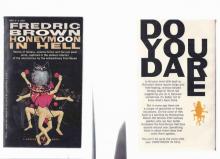 Hall of Mirrors
Hall of Mirrors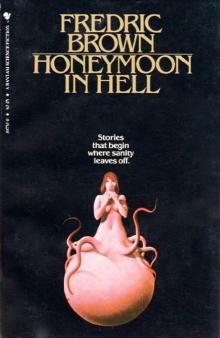 Honeymoon in Hell
Honeymoon in Hell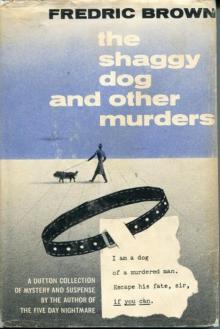 The Shaggy Dog and Other Murders
The Shaggy Dog and Other Murders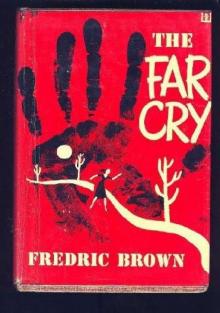 The Far Cry
The Far Cry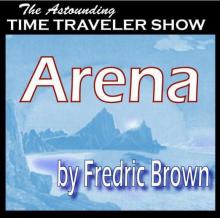 Arena
Arena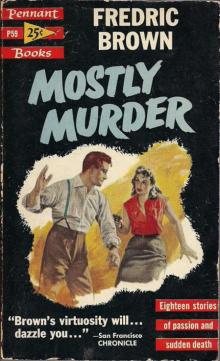 Mostly Murder
Mostly Murder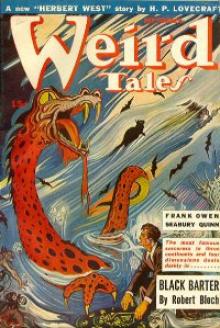 The Geezenstacks
The Geezenstacks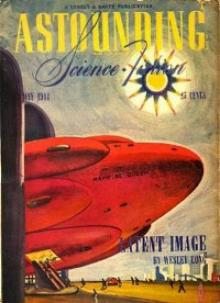 The Yehudi Principle
The Yehudi Principle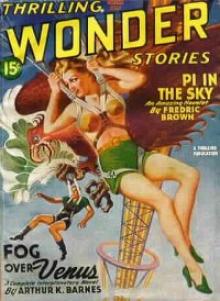 Pi in the Sky
Pi in the Sky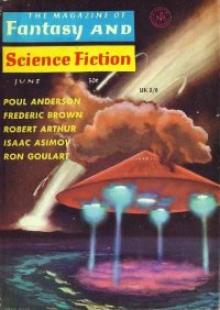 Eine Kleine Nachtmusik
Eine Kleine Nachtmusik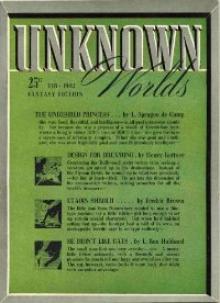 Etaoin Shrdlu
Etaoin Shrdlu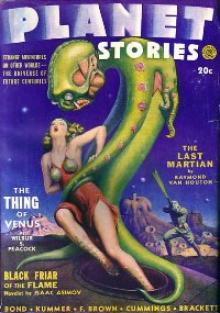 The Star Mouse
The Star Mouse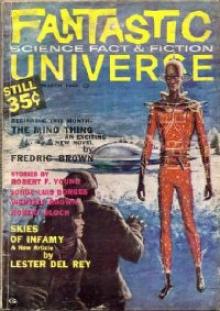 The Mind Thing
The Mind Thing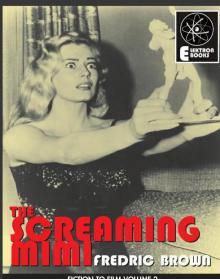 The Screaming Mimi
The Screaming Mimi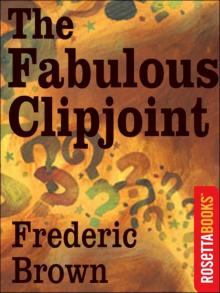 The Fabulous Clipjoint
The Fabulous Clipjoint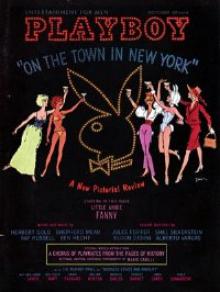 Puppet Show
Puppet Show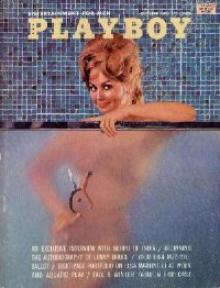 It Didn't Happen
It Didn't Happen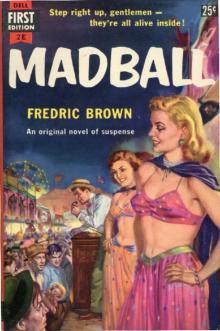 Madball
Madball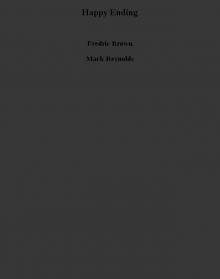 Happy Ending
Happy Ending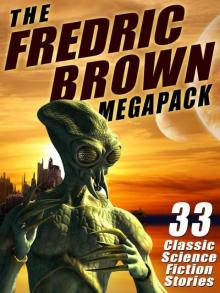 The Fredric Brown Megapack: 33 Classic Science Fiction Stories
The Fredric Brown Megapack: 33 Classic Science Fiction Stories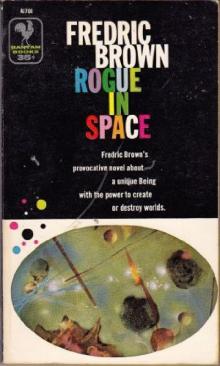 Rogue in Space
Rogue in Space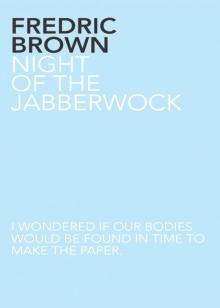 Night of the Jabberwock
Night of the Jabberwock The Dead Ringer
The Dead Ringer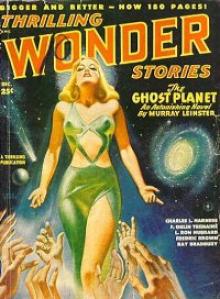 Knock
Knock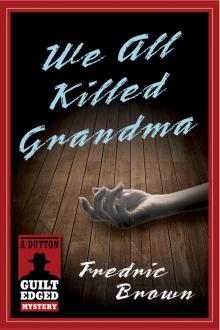 We All Killed Grandma
We All Killed Grandma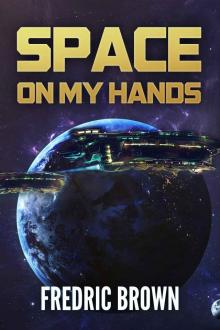 Space On My Hands
Space On My Hands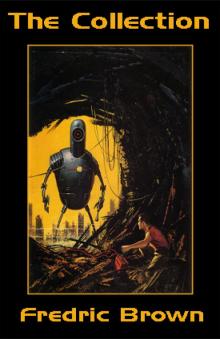 The Collection
The Collection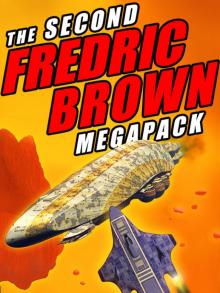 The Second Fredric Brown Megapack: 27 Classic Science Fiction Stories
The Second Fredric Brown Megapack: 27 Classic Science Fiction Stories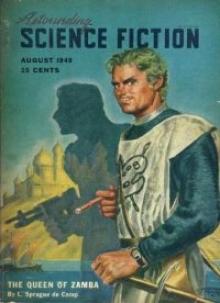 Letter to a Phoenix
Letter to a Phoenix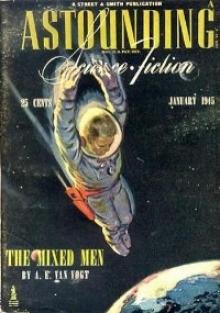 The Waveries
The Waveries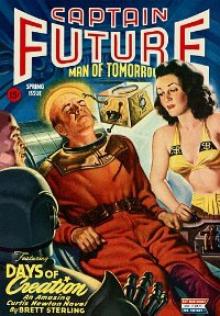 Nothing Sirius
Nothing Sirius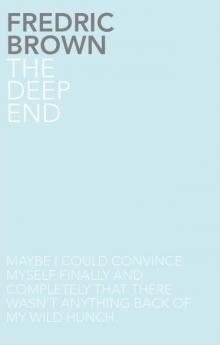 The Deep End
The Deep End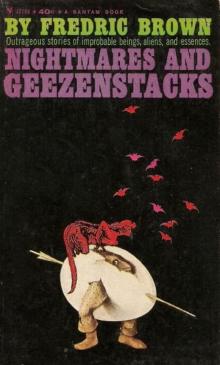 Nightmares & Geezenstacks
Nightmares & Geezenstacks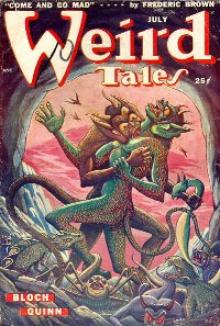 Come and Go Mad
Come and Go Mad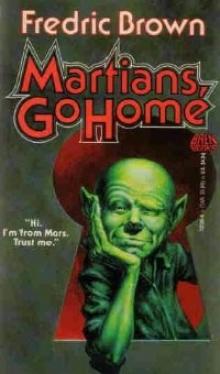 Martians, Go Home
Martians, Go Home